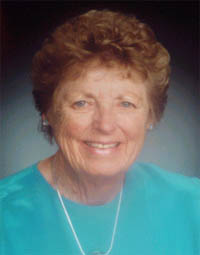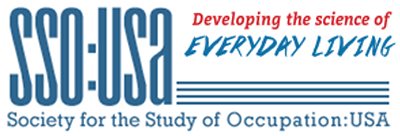Dr. Elizabeth Yerxa - 2003
The Infinite Distance Between the "I" and the "It"
Elizabeth J. Yerxa, Ph.D., OTR, FAOTA
Distinguished Professor Emerita
University of Southern California
 Dr. Yerza was the second recipient of the Ruth Zemke Lecture at the Society for the Study of Occupation: USA's Annual Research Conference. Dr. Yerxa's lecture, entitled "The Infinite Distance Between I and the It" focused on the need for occupational scientists to develop a better understanding of occupation through integral science. Drawing on Ken Wilber's theory of everything, Dr. Yerxa challenged occupational scientists to develop an integral science of occupation that considered internal as well as the external aspects of occupation for both individuals and groups. She explained that to develop an internal individual understanding of occupation researchers must explore occupation through the experiences of the individual and to develop an internal group understanding of occupation researchers should examine culture and group beliefs, values, and actions. Qualitative approaches would particularly enhance these studies, developing an emic understanding of occupation. Dr. Yerxa went on to explain the etic, or "it" perspective of research, that is, the generic person that is representative of a larger population. Researchers would use quantitative designs such as experimental and correlational studies, employing statistical analysis to develop the understanding of the external, generic individual, the "it." Social research using large data sets would allow researchers to understand the external group, the impersonal group. Dr. Yerxa asserted that occupational scientists need all four areas of research in order to develop a fuller understanding of people and their occupations. Dr. Yerza was the second recipient of the Ruth Zemke Lecture at the Society for the Study of Occupation: USA's Annual Research Conference. Dr. Yerxa's lecture, entitled "The Infinite Distance Between I and the It" focused on the need for occupational scientists to develop a better understanding of occupation through integral science. Drawing on Ken Wilber's theory of everything, Dr. Yerxa challenged occupational scientists to develop an integral science of occupation that considered internal as well as the external aspects of occupation for both individuals and groups. She explained that to develop an internal individual understanding of occupation researchers must explore occupation through the experiences of the individual and to develop an internal group understanding of occupation researchers should examine culture and group beliefs, values, and actions. Qualitative approaches would particularly enhance these studies, developing an emic understanding of occupation. Dr. Yerxa went on to explain the etic, or "it" perspective of research, that is, the generic person that is representative of a larger population. Researchers would use quantitative designs such as experimental and correlational studies, employing statistical analysis to develop the understanding of the external, generic individual, the "it." Social research using large data sets would allow researchers to understand the external group, the impersonal group. Dr. Yerxa asserted that occupational scientists need all four areas of research in order to develop a fuller understanding of people and their occupations.
Abstract: Science and medical practice in the 21st century often separate the "I" of consciousness, the one who experiences daily life, from the "It" of an object, in order to concentrate upon a body that can be probed, tested and fixed. This "flat" view of the world may also influence the development of occupational science and the practice of occupational therapy to the detriment of the profession and its potential contribution to humankind. For occupation, performed by a person, must be done and experienced by an "I" who initiates it and is conscious of its effects. Thus, occupational science needs to become an integral human science uniting the "I" of intention with the "It" of behavior, the "We" of cultures and the "They" of social systems. In order to create an integral science, occupational scientists need to discuss and debate the nature of our science, name our pursuit of wisdom, identify the ethics and values central to inquiry and intervention, and broaden and personalize the evidence sought to demonstrate the efficacy of occupational therapy practice. The mission of integral occupational science will be to promote human flourishing.
|

